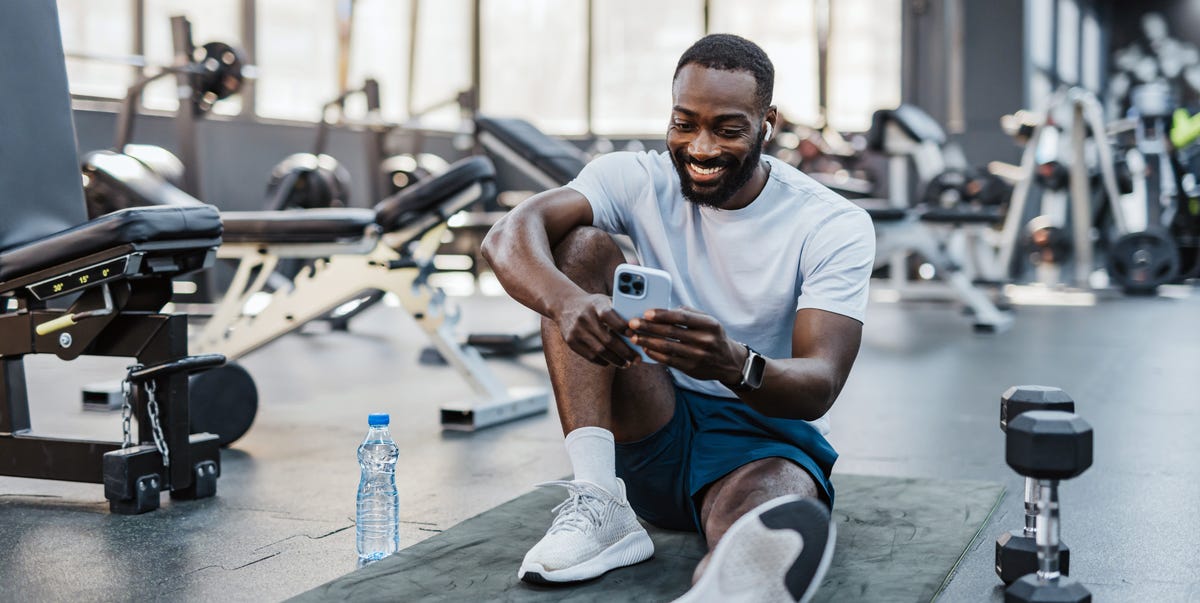Can AI Really Revolutionise Your Fitness? We Asked 7 Industry Insiders for Their Takes

Whether you’re an AI superfan or an overall sceptic, artificial intelligence is changing the way we shape up. It’s influencing when we train, what we eat and how we recover – often without us even realising it – while making personalisation possible at a scale never seen before.
But it has its limits too. We asked seven industry insiders for their thoughts on what AI will (and won’t) achieve in 2025.
Samsung
THE EXPERT: Annika Bizon, Marketing and Omnichannel Director for UK and Ireland
Bizon believes the integration of AI with wearables will supercharge our wellness potential.
‘The AI and fitness industry is projected to hit £27 billion by 2030, a four-fold increase from 2022. That’s partly driven by the rise of devices like the Samsung Galaxy Ring, which can assess your physical readiness to train and compare your current performance against your previous best. AI will make understanding your overall wellness picture easier, distilling information from multiple sources. Our goal is to simplify the user experience. Supercharged with AI, Samsung Health will cater for all your wellness needs, from recommended movements to early detection of illness or injury risk. We’re at the precipice of where this technology can take us.’
Fresh Fitness Food
THE EXPERT: Caspar Rose, CEO
AI is exciting, but Rose believes human intervention is still vital.
‘Companies like ZOE and Noom – which leverage substantial user data to personalise insights – show promise. As general LLM [large language models – a type of AI that can read and generate text], like OpenAI’s B2B service, gain more context about users, these too will be able to deliver customised nutrition plans. But there are risks when it comes to situations that require nuance, like supporting someone with an eating disorder. Our qualified nutritionists can identify these issues; AI can’t provide the same level of accountability.’
Peloton
THE EXPERT: Brent Tworetzky, SVP of Product
Tworetzky says AI will get better at in-class feedback to help you hit your training goals.
‘AI tech will get better at prediction through pattern recognition and by using broader data sources to inform things like workout effectiveness and injury prevention. AI in mixed-reality using heads-up displays such as smart glasses is also an exciting prospect. With Peloton Guide, we’re especially excited about our new Form Feedback feature, which provides real-time technique corrections. Nevertheless, AI does have difficulty with edge cases and complex situations and can feel robotic and impersonal, which is why the importance of human connection to build trust will remain.’
Runna
THE EXPERT: Ben Parker, Co-Founder
AI-powered virtual coaches in augmented reality will become mainstream, says Parker.
‘Apps like Runna are increasingly leveraging AI models to adapt programmes dynamically based on user goals, biometric feedback and past behaviour. By integrating more deeply with wearables, harnessing heart rate variability and recovery metrics, this will become more predictive and proactive. We could see virtual coaches using augmented reality or voice next, but AI might struggle in areas requiring deep emotional intelligence, like understanding the mental state of an athlete, or to manage unique, non-quantifiable events like rapidly changing weather conditions.’
1Rebel
THE EXPERT: Michelle Stoodley, Marketing Director
Stoodley believes the fitness industry should be wary of letting AI know all our secrets.
‘AI hasn’t really reached the boutique sector yet, given our sector is hyper-focused on people-based service. Every touchpoint, from the moment someone walks into reception to their experience in class, requires human input, and a level of empathy that AI just doesn’t have – not yet anyway. AI could benefit online-based services, but the industry should approach this with caution. Fitness is a hugely unique experience, influenced by factors like genetic makeup, mental health and motivation. Do we really want AI to know us on this intimate level?’
Third Space
THE EXPERT: Lauren Wilson, CMO
It could be a handy accessory, but AI will never replace the real thing, argues Wilson.
‘AI shows some potential to quickly and accurately sift through large amounts of data to provide personalised health insights. The likes of Whoop’s AI coach are incredibly effective at answering questions about your metrics, like “What was my peak HRV and what drove it?” But a lot of frustration remains with AI solutions when it comes to servicing our members, unless it’s a very transactional query. Lower-cost operators have experimented with digital classes in studios, but they are always poorly attended. There’s nothing like a real-life, highly trained instructor to coach and motivate you.’
Technogym
THE EXPERT: Enrico Manaresi, Global Press & Media Director
Manaresi says AI will be one of many technologies that enable healthy longevity.
‘We’ve always had a focus on personalisation. Tools like The Cloud and AI have simply enabled this personalisation to become more precise. We call this Precision Training. In the future, AI will play an increasingly important role in health. Specifically, in enabling healthy longevity. It’s already allowing us to tailor individual programmes for people with diabetes, hypertension or cancer, helping treat, rehabilitate or alleviate symptoms. AI won’t replace gyms or trainers, but it can enhance the user experience.’
Related
Yaslen Clemente Shows Off Leg Day Gains and Shares Her…
Yaslen Clemente isn't just an influencer—she's a fitness powerhouse. The social media star is known for her intense workouts, and she recently sha
Samantha Espineira Stuns in Blue Swimsuit and Shares Her 5…
Samantha Espineira knows how to turn heads, both on and off the runway. The successful model and Instagram influencer regularly shares breathtaking
The Best Fitness Trackers To Help You Reach Any Health…
Best Health Tracker: Oura Ring 3Why We Love It: I’ve tried many, many fitness trackers—but I tend not to stick with one watch or band for very long. I’ve
#CycleSyncing debunked: Popular TikTok trend not backed by science
A new study has debunked a popular TikTok wellness trend called cycle syncing, which claims that tailoring a workout routine to match the hormonal changes that












